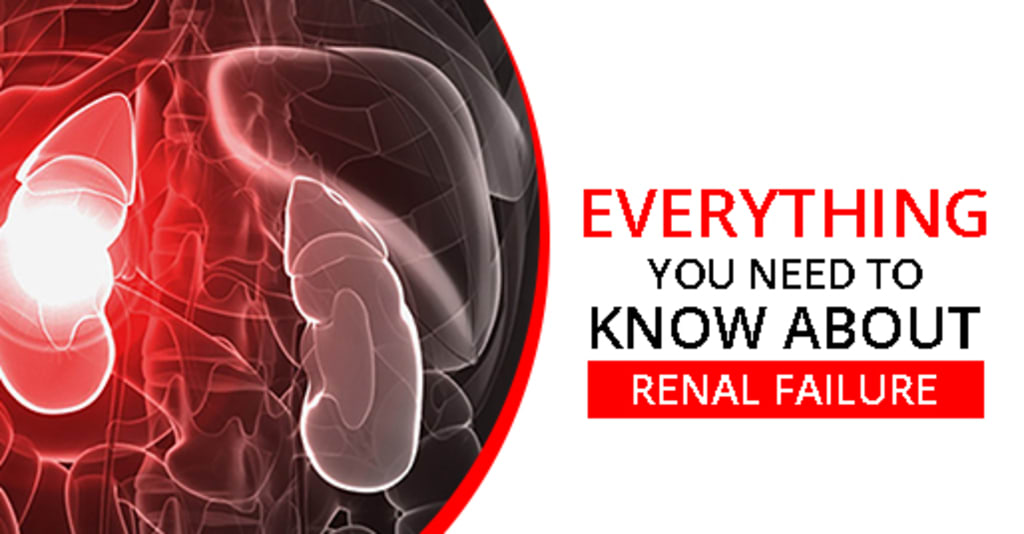Everything You Need To Know About Renal Failure
Kidney Failure Treatment in Ayurveda

What is a Kidney Failure?
Kidney failure is the inability of kidneys to function normally. When this happens, fluid and waste levels within the body rise unexpectedly and lead to life-threatening complications.
The evaluation of kidney failure is done with the help of a test called the glomerular filtration rate. GFR defines how efficient your kidneys are in terms of the blood filtration process. Having a GFR of 90 or above symbolizes well-functioning kidneys, while below 15 results in kidney failure. The symptoms during ESRD may result from the waste and extra fluid in the body.
Usually, nephrologists recommend dialysis and transplant for commendable recovery, but ayurvedic treatment for kidney failure has also gained attention in recent times.
What are Your Kidneys?
The kidneys are a pair of organs located towards the lower back. One on each side of the spine, this organ is really helpful in keeping you healthy. Working continuously, they assure that the body gets rid of toxins and other waste compounds in the blood. Later on, the kidneys send them to the bladder, which is removed during the blood filtration process.
Some of the important functions carried out by healthy kidneys include:
- Helping the body get rid of waste and extra fluid.
- Balancing the number of elements in the blood, including sodium, potassium, and calcium.
- Making hormones that regulate blood pressure and generate RBCs.
- Triggering the production of Vitamin D.
What Are Some Tell-Tale Signs of Kidney Failure?
Kidney failure or renal failure is one of the silent diseases affecting the body in many ways. Initially, when any impairment starts to begin, a few of the symptoms can be experienced by the person, such as:
- a reduced amount of urine
- increased or decreased urine frequency
- foamy or frothy urine
- smelly urine
- high blood pressure
- swelling of the legs, ankles, and feet due to fluid retention
- unexplained shortness of breath
- drowsiness or fatigue
- persistent nausea
- confusion
- pain or pressure in your chest
- seizures and coma
- malnutrition due to poor appetite
- anemia
- sleep issues
- headaches and chills
When to see a doctor
Consult your doctor if you experience high blood pressure, swelling in the body for no apparent reason, and changes in urination. Your primary care physician may run a series of tests to diagnose the cause of symptoms. He may suggest consulting a nephrologist if the tests show you have kidney disease. After a recommendation from your nephrologist, you can take Ayurvedic Treatment For Kidney Failure.
What Are The Stages of Kidney Failure?
Kidney failure is classified into five stages: mild to moderate to the severe stage known as end-stage renal disease. The symptoms and complications gradually progress as the stage advances.
The glomerular filtration rate characterizes stages of kidney failure.
- Stage1: GFR is greater than 90, denoting normal kidney function.
- Stage2: Mild damage to the kidney function with GFR in between 60 and 89.
- Stage 3A: This is the stage in which GFR declines with severe complications. GFR is between 45 and 59.
- Stage 3B: GFR is quite low in this stage, between 30 and 44.
- Stage 4: Severe decline in kidney function.
- Stage 5: End-stage renal disease in which GFR drops below 15.
You should begin ayurvedic treatment for kidney failure as soon as you are diagnosed with CKD. Having avoided the treatment will cause critical situations later in life.
What are the causes of kidney failure?
The most common causes of kidney failure are diabetes and hypertension. Both the conditions are known to affect kidney function in the long run. It takes years for them to damage the kidney function completely. Make sure to adopt a healthy lifestyle and dietary habits if you have diabetes and hypertension already.
In many cases, kidney failure is the loss of kidney function within hours, a tell-tale called acute kidney failure. This is temporary, and you may get better with medications and return to normal life once again.
Common causes of AKF or AKD include:
- Autoimmune kidney diseases
- Certain medications
- Dehydration
- Any obstruction in the urinary tract
- Uncontrolled systemic diseases like heart or liver disease
Mostly, kidney failure does not happen overnight. Many health conditions interfere with the kidney's ability to function precisely.
- Polycystic kidney disease,
- Glomerular diseases such as glomerulonephritis
- Lupus and other autoimmune diseases
Ayurvedic Treatment For Kidney Failure
Ayurveda is yet another treatment approach to bring down some threatening complications of kidney failure. The use of herbs in medicine promises permanent recovery of the kidneys and revives the damaged cells and tissues.
Your ayurvedic nephrologist may address your condition and provide customized treatment accordingly. Rest assured, there are no obnoxious effects linked to the use of ayurvedic treatment for kidney failure.






Comments
There are no comments for this story
Be the first to respond and start the conversation.